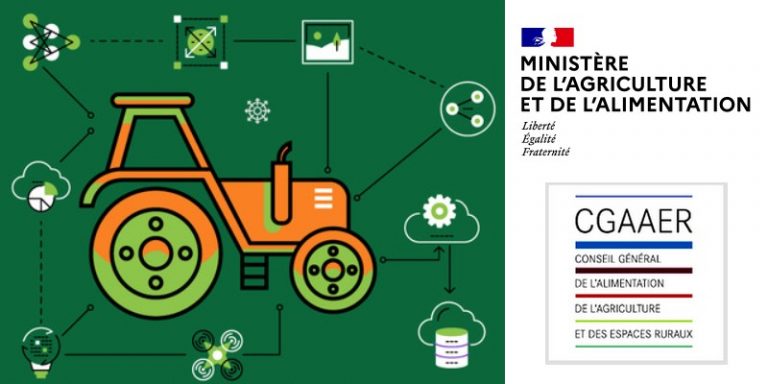
Gradually, artificial intelligence, data and more broadly new technologies are making their appearance in several sectors, including agriculture. For example, the government launched the French AgriTechinitiative in early September to support the development, maturation and export of know-how in the AgriTech and FoodTech sectors. The state is now interested in the impact of digital transformation on the professions of the Ministry of Agriculture since it requested, two years ago, a report written by the General Council of Food, Agriculture and Rural Areas (CGAAER) on the subject which has just been delivered.
Work on the impact of digital transformation carried out in two stages: analysis and long-term perspective
The work done to better understand the impact of digital transformation on the jobs of the Ministry of Agriculture and Food stems from a request from the same ministry to the CGAAER. This mission consisted of two phases:
- The first was to analyze the potential impacts of digital technology on four important jobs at the MAA, which represent more than half of the ministry’s jobs:
- For teachers in agricultural high schools, the transformations are already well underway, with two complementary dimensions: professional technical training that must integrate the development of digital tools and new teaching methods.
- The activity of an instructor of Common Agricultural Policy (CAP) files in the Departmental Directorate of Territories (DDT) will change profoundly with the future reform of the CAP and the implementation of monitoring. These developments will lead to significant changes in the professions in the DDTs and the services and payment agency (ASP), which need to be analysed and supported without delay.
- The job of health inspector in slaughterhouses is very much governed by Community regulations and no exception to human inspection is planned at this stage. The context of its action is marked by increasing transparency in the activity of slaughterhouses. In the medium term, however, it is necessary to keep a watchful eye on the possible contributions of digital technology and artificial intelligence to the inspector’s work, after prior experimentation.
- For an officer in a management position at the DPMA, the availability and analysis of data on fisheries resources are essential. This data comes from many external bodies and digital technology is an essential vector for retrieving and processing this data.
- The second phase of work was devoted to building a more general and longer-term perspective. Beyond the four professions studied above, the diversity of the professions practiced at the MAA is such that it is not possible to anticipate the future impact of digital technology on each of them. According to the CGAAER, it is necessary to prepare the digital transformation of the entire professional body of the ministry.
In the report, it is clearly notified that the digital transformations of organizations do not result in a gain in manpower, but in the fact that jobs and work practices are drastically modified, particularly through the acquisition of new skills in connection with databases.
The six recommendations for a better digital transition of employment proposed by the CGAAER
Six recommendations were made by the CGAAER for the Ministry of Agriculture:
- To share with all levels of the ministry the stakes of a digital transformation at the MAA, which goes far beyond the continuation of current modernisation actions. The preparation of an MAA transformation strategy (see R2) will contribute to this objective.
- Describe what is expected of the MAA’s digital transformation, through three types of complementary documents: the ambition of this transformation; the perspectives and the project for each departmental sector of activity, describing the transformations of the professions; a cross-cutting framework that will notably specify the conditions (notably legal) of a proactive sharing of data.
- For each major project to transform a ministerial mission, prepare, on the initiative of the central administration department, a support plan for departments and employees, which must include various components: reexamine the jobs performed within the MAA and work organisations; specify the jobs affected by the digital transformation, the skills required and the training or recruitment needed to meet these needs; update the files in the ministerial job directory. This support plan will have to be discussed with the employees and their representatives.
- The four occupations studied in this report (CAP instructor in DDT, slaughterhouse inspector, teacher in agricultural high schools, and DPMA manager) could be used to formalize these transformation plans, starting with the occupations of teacher and CAP instructor. The working method thus defined will then be extended to other MAA sectors of activity.
- Invest in the key skills needed to steer and manage MAA’s digital transformation.
- Establish specific governance for the MAA’s digital transformation project, with the aim of making it a tool for demonstrating the relevance of this transformation, through the involvement of numerous stakeholders, the sharing of data and the use of digital tools.
These six recommendations converge towards an ultimate goal: to support the ministry’s services and agents to make the digital transformation as successful as possible.
Translated from Le CGAAER propose son rapport sur l’impact de la transformation numérique sur les métiers du ministère de l’Agriculture









